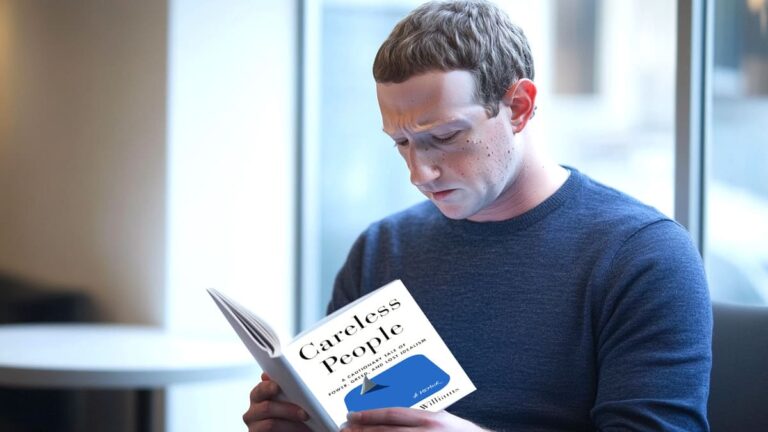In a recent book that has stirred up significant attention in the U.S., former Meta executive Sarah Wynn-Williams has opened up about the inner workings of the tech giant and its leader, Mark Zuckerberg. Her candid revelations, filled with controversial accusations, have raised eyebrows and sparked a new wave of interest in the company’s culture and leadership.
A Glimpse Inside Meta: “Careless People”
In her book Careless People, Wynn-Williams provides a detailed account of her years working at Facebook, eventually rising to oversee global policy at the company. While much of the information she shares has been speculated upon in the past, she includes personal anecdotes that reveal a deeply troubling side of Zuckerberg and other high-ranking Meta executives. The book’s subtitle, “A Stark Tale of Power, Greed, and Lost Idealism,” sets the tone for her critique, which primarily focuses on the management style of Zuckerberg, his behavior, and the toxic culture at Facebook.
Wynn-Williams describes how, during her time at Facebook, she witnessed firsthand how the company’s leadership handled challenges and controversy. She accuses Zuckerberg of being dishonest during a 2018 Senate hearing and of downplaying his connections with the Chinese Communist Party—actions that have raised serious ethical concerns.

A Reckless Leader and Toxic Culture
Perhaps the most shocking of Wynn-Williams’ claims is her description of Mark Zuckerberg’s leadership style. She portrays him as someone who constantly deflects responsibility, frequently blaming his team for mistakes—such as when he lost his passport while in Peru and blamed his staff for it. The description of Zuckerberg as irresponsible and a bad loser comes from an embarrassing board game incident, which paints a picture of a leader whose behavior seems to match the erratic policies of the company.
Wynn-Williams also highlights Sheryl Sandberg, the former Chief Operating Officer of Meta, accusing her of fostering a toxic work culture. She recalls receiving professional documents from Sandberg while the latter was giving birth, further underscoring the pressure-filled environment at the top of the company. According to Wynn-Williams, Joel Kaplan, Meta’s current President of Global Affairs, was another key player in maintaining an unsupportive work environment.
The Myanmar Crisis and Facebook’s Inaction
The most alarming revelations come from Wynn-Williams’ account of the Myanmar crisis. When the country’s military launched an aggressive campaign against the Rohingya Muslim minority in 2016, she claims that Facebook did not take adequate action to prevent the spread of hate speech on the platform. Despite suggestions to bring in a human rights expert, Kaplan allegedly blocked her efforts, resulting in unchecked violence being fueled through the platform. Wynn-Williams states that the executives, including Zuckerberg, “didn’t care” about the issue, reflecting a shocking level of disregard for human rights and the consequences of their platform’s reach.
Meta Responds to the Claims
Meta, not surprisingly, has vigorously defended itself against Wynn-Williams’ accusations. In a statement to SFGATE, a spokesperson for the company called the allegations “misleading and unfounded”, asserting that Wynn-Williams was terminated for poor performance and a toxic attitude. Meta also pointed out that many of the claims in the book were already known or were fabrications.
However, the company’s reaction has only added fuel to the fire. Meta quickly took legal action, pointing out that Wynn-Williams had signed a non-disparagement agreement upon her departure. By publishing her book, she allegedly violated this agreement, which led to a court order preventing further promotion of the book. Ironically, this legal action may have had the opposite effect, leading to the book rising in popularity—it’s now ranked among the top three bestsellers on Amazon.
A Reflection of the Times
Wynn-Williams’ book and its fallout serve as a mirror to the challenges faced by today’s tech giants. Zuckerberg and his leadership at Meta are increasingly under scrutiny, and as the book’s revelations spread, many are beginning to question the practices that have propelled companies like Facebook to dominate the digital landscape.
Whether you agree with the allegations or not, it’s impossible to ignore the human cost of these corporate cultures. Transparency, accountability, and ethics—all of which Wynn-Williams addresses—are vital aspects that tech leaders must grapple with in an ever-changing digital world.
In the end, Careless People serves as both a personal memoir and a broader commentary on the power dynamics within Big Tech. If the book’s claims are proven true, it will surely add to the growing conversation on corporate responsibility and the moral obligations of companies that shape much of our online lives. As the world watches, it remains to be seen what, if any, consequences this will have for Zuckerberg and Meta’s future.





